Ever found your sushi lacking that zing because you’re out of wasabi?
Yup, we’ve all been there. Good news though, there’s a whole lineup of awesome stand-ins ready to save your sushi night.
And nope, we’re not just talking about grabbing the hottest thing in your fridge.
These substitutes are about to make your dishes pop with flavor, adding just the right kick without sending you running for a glass of water.
Stick around and I’ll fill you in on the top 5 swaps that’ll keep your food exciting.
What is Wasabi?

Wasabi is a condiment originating from Japan that is commonly used to accompany sushi dishes.
The taste and texture of wasabi can be described as strong, sinus-clearing, almost horseradish-like heat, and it comes in the form of either a fresh green paste or a dried powder.
Typically when eating sushi at a restaurant, you will find it served in the form of powdered wasabi, which has been mixed with some water.
Fresh wasabi root is hard to come by outside of Japan and is usually only served in high-end sushi restaurants.
It has also been found to have anti-bacterial properties making it an ideal accompaniment for raw fish dishes like sushi or sashimi.
Wasabi’s paste-like consistency allows it to be served with many dishes, especially sushi and sashimi, in order to enhance the meal’s taste (the famous ‘wasabi kick’).
People can also spread the paste on crackers or mix it in salads for a nice twist on classic recipes.
Many chefs also love it because of its ability to raise any dish’s colors, making meals look more appealing.
The 5 Best Substitutes for Wasabi
If you’re looking for a spicy alternative to wasabi, you have several options.
Here are some of the best substitutes for wasabi that can help you add heat and flavor without having to use the real thing.
1 – Horseradish
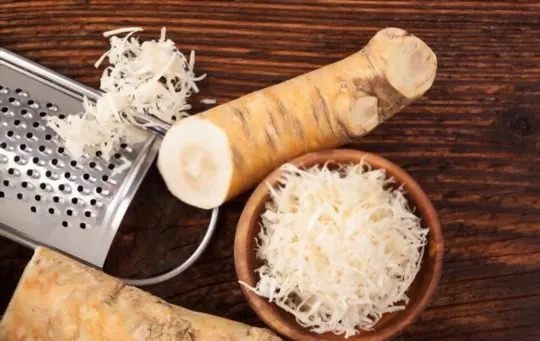
Horseradish is a spice with a bite.
It has an earthy flavor, and its texture is fine and fairly dry, so it crunches a bit when you chew it.
Its intense heat adds an enjoyable zing to many dishes and can even be used as a substitute for wasabi in sushi or other Asian-inspired recipes.
Giving the same punch of sharpness to your meal without the hassle of hunting down the unripe Japanese creation, horseradish can be grated into sauces, whipped cream, mashed potatoes, macaroni, and cheese – almost anything needing some extra flavor with an added kick.
2 – Ginger
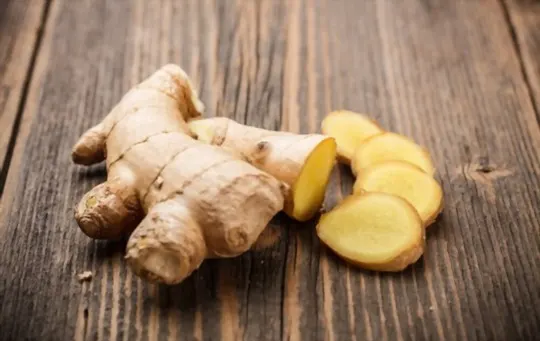
Ginger is a root that has been utilized since ancient times thanks to its sharp and fiery flavor.
It has a spicy-sweet taste, with an intense aroma and a crunchy texture when eaten raw.
In many cases, it can be used as an economical alternative to wasabi.
While grated ginger can’t always completely mimic the flavor of wasabi, it still offers a suitable substitute by providing some of the same heat while also adding a zesty bite.
A blend of grated ginger, rice vinegar, and lemon juice typically makes for a great swap-in in place of wasabi condiments, giving you the perfect level of spiciness to enhance your favorite dishes.
3 – Karashi
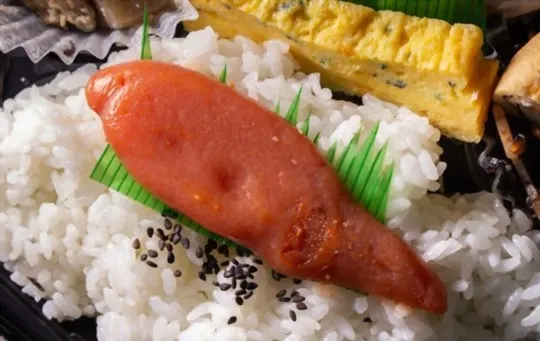
Karashi is an orange-brown condiment made from mustard oil and chili peppers, commonly eaten in Japan.
It has a potent, spicy taste, rich with the aromas of allspice, garlic, and paprika that give it its unique flavor.
The texture is coarse and grainy, with distinctive crunchy bits of whole pepper seeds suspended throughout.
Karashi can be used as a substitute for wasabi in sushi recipes, as both are a part of traditional Japanese cuisine.
The difference lies in the intensity—karashi is much spicier than wasabi, making it pungent enough to really clear out the sinuses.
Fortunately, you don’t need a lot; a teaspoon or teaspoon equivalent should do the trick.
4 – Mustard
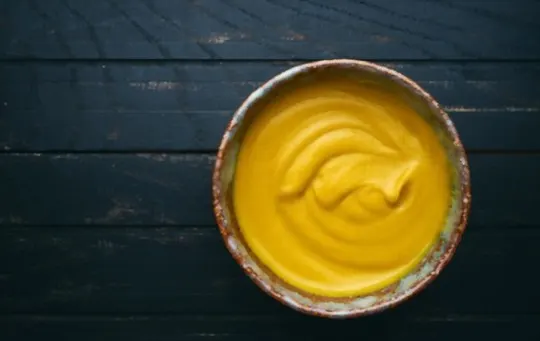
Mustard is a staple in many households, adding a spicy and sharp flare to any given dish.
Its distinctive blend of tangy and piquant flavors makes it unique, and its thick texture gives meals a zesty presence.
Mustard is an especially popular condiment for sandwiches and French fries because it has the perfect punch that can instantly add flavor to any dull munchies.
Additionally, mustard can also be used as a substitute for wasabi- all one needs to do is mix together some mustard with honey for sweetness, lemon juice for acidity, and some horseradish for spice.
An ideal combination of these four ingredients creates a perfectly balanced flavor that acts as the perfect replacement for wasabi.
5 – Hot Daikon
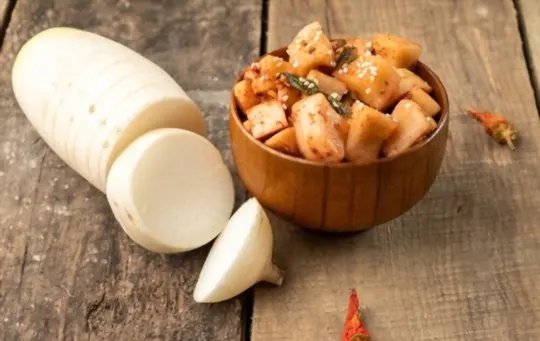
Hot daikon, a root that looks like a large white radish, is an extremely popular condiment in Japanese cuisine.
It’s known for its spicy flavor and crunchy texture that provides a burst of flavor to any dish.
Hot daikon is the perfect substitute for wasabi paste if you want added kick.
However, it can stand on its own as well – it’s commonly served with barbecue or tempura dishes or as a topping for ramen.
Truly versatile and deliciously spicy, hot daikon is sure to be a hit in any meal.
Conclusion
In conclusion, wasabi is a traditional condiment used in many Japanese recipes.
But, if you don’t have access to the real thing, there are plenty of other alternatives that can be used as substitutes.
Horseradish, ginger, karashi, mustard, and hot daikon are all great options for adding spice and flavor to your meal without having to go to the extra effort of finding wasabi paste.
With these five options, you’ll be able to enjoy your favorite Asian-inspired dishes with an added kick.
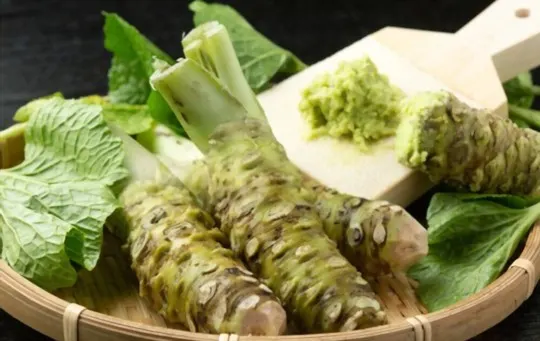
The 5 Best Substitutes for Wasabi
Ingredients
- Horseradish
- Ginger
- Karashi
- Mustard
- Hot Daikon
Instructions
- Pick your favorite substitute from the list above.
- Follow cooking directions for your selected substitute with the proper ratio of ingredients.

Andrew Gray is a seasoned food writer and blogger with a wealth of experience in the restaurant and catering industries. With a passion for all things delicious, Andrew has honed his culinary expertise through his work as a personal chef and caterer.
His love for food led him to venture into food writing, where he has contributed to various online publications, sharing his knowledge and insights on the culinary world. As the proud owner of AmericasRestaurant.com, Andrew covers a wide range of topics, including recipes, restaurant reviews, product recommendations, and culinary tips.
Through his website, he aims to inspire and educate fellow food enthusiasts, offering a comprehensive resource for all things food-related.

Leave a comment